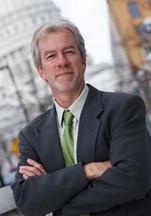The Climate Corner: It’s Time to Develop Wisconsin’s Clean Power Plan
- Share
- Tweet
- Pin
- Share
By Keith Reopelle
Recently, the D.C. Circuit Court of Appeals heard oral arguments on the EPA’s Clean Power Plan (CPP), the most significant step our country has ever taken to address climate change. The outcome of this legal challenge will have major environmental and public health ramifications for Wisconsin and the nation.
A diverse coalition of public health, environmental, religious organizations and major Wisconsin businesses support the CPP’s commonsense approach to addressing climate change and recognize that the plan presents many environmental, health and economic opportunities for our state.
The CPP sets achievable, science-based carbon emission limits on electricity generated using coal and natural gas based on proven, cost-effective approaches that have been used for years to reduce emissions of harmful air pollution. Importantly, it provides states with extraordinary flexibility in choosing how to meet the plan’s requirements given state-specific conditions.
Instead of a one-size-fits-all requirement, EPA has given states many options for reducing carbon emissions, including increasing solar and wind power and energy efficiency, making existing fossil-fuel plants more efficient, and switching from coal-fired generation to natural gas, which emits less carbon.
In court, EPA demonstrated the CPP is consistent with the law, earlier court precedents, and other U.S. Environmental Protection Agency (EPA) programs implemented by both Democratic and Republican administrations. On three separate occasions, the U.S. Supreme Court has already upheld EPA’s authority and responsibility under the Clean Air Act to protect human health and welfare by limiting carbon pollution.
The CPP is a golden opportunity to improve public health. By reducing air pollution from burning coal, the rule is projected to prevent up to 3,600 premature deaths, 90,000 asthma attacks and 300,000 missed work and school days per year by 2030. Last week, more than 1,300 health professionals from across the country, including more than 40 from Wisconsin representing institutions such as UW Health, declared their commitment to addressing climate change to protect human health.
The CPP also provides an important opportunity to address the moral obligation we have to our children and grandchildren to protect the environment they will inherit, and to poor and minority populations that are disproportionately impacted by the air pollution from power plants. Pope Francis’s Environmental Encyclical, Laudato Si, emphatically lays out the ethical and moral imperatives to address climate change.
Finally, the CPP presents an important economic opportunity for Wisconsin, which sends about $16 billion out of the state every year to import coal, oil and natural gas. By investing in clean energy solutions for the future – such as solar and wind power and energy efficiency – we can keep many of these dollars in Wisconsin, investing them in our businesses, farms and workers. If we comply with the CPP by emphasizing energy efficiency and renewable energy, then we will not only boost our economy, but also lower our electric bills. A 2015 report by Clean Wisconsin found that if we reduce our carbon emissions by making a modest increase in renewable energy, and double down on energy efficiency, then we can meet the rule’s requirements at a savings of $55 million for Wisconsin ratepayers.
Unfortunately, our governor and attorney general have chosen to challenge the CPP in court and have refused to allow our state agencies to plan how to comply if the state loses the suit. This is a risky and irresponsible strategy. Every other state in the Midwest is already planning on how to comply in the most effective ways available. When the lawsuit is decided – and as a party to that lawsuit, Clean Wisconsin is confident EPA will prevail – our DNR will be behind and need to scramble to get a compliance plan pulled together or accept a one-size-fits-all plan from EPA. Defaulting to a federal plan would not be in the interest of either our utilities or their customers. To make sure Wisconsin will be in compliance at the lowest cost for customers, and in a way that provides the most economic opportunities to our businesses, Wisconsin should be creating its clean energy future now. We are wasting valuable time.
There is no question climate change will have significant negative impacts on our health, natural resources, and economy, particularly if we continue to fail to take proactive action. Our policymakers need to look forward and not backward, and recognize that the future requires a speedy transition to a low carbon electric system, and that this transition will help, not harm, Wisconsin.

Keith Reopelle
Keith Reopelle is senior policy director of Clean Wisconsin, a statewide environmental group. At Clean Wisconsin, Reopelle is responsible for state and regional policies addressing global warming. He has more than 25 years experience lobbying on issues including sustainable energy policies, polluted runoff, wetlands, metallic mining, recycling, incineration, air toxins, pesticide reduction, forest management, and land preservation.
The Climate Corner is a monthly column featuring a variety of writers from around the state and Door County addressing various aspects of the challenges and opportunities climate change presents. The column is sponsored by the Climate Change Coalition of Door County, which is dedicated to “helping to keep our planet a cool place to live.” The Coalition is always open to new members and ideas. Contact the Coalition at [email protected].
